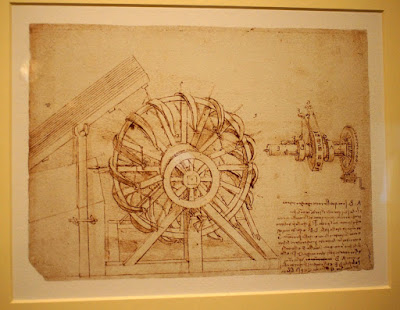Yesterday I visited the exhibition
"Leonardo da Vinci, inventor and scientist"
at the Osthaus Museum in Hagen, with my husband.
The exhibition is held to celebrate the 500th anniversary of death of this genius
The exhibits are numerous reprints (facsimiles) and models built using the scetches of da Vinci.
The facsimiles are from collections of
- Codex Atlanticus, Biblioteca Ambrosiana, Milan, Italy
- Biblioteca Reale, Turin, Italy
- Institut de France, Paris
- Windsor Castle Royal Library, Windor, GB
Self portrait, Turin, 1512
Leonardo as inventor
Study of a flying man, 1485, Milan
Model of the flying man
Model of the wind gauge
Study of a helicopter, 1486-1490
Model of the helicopter
Study of a boat bridge, 1490, Milan
Model of the boat bridge
Study of a turn bridge, 1490, Milan
Model of the turn bridge
Model of a double-walled ship's side, referred to a sketch of 1487-1489
Study of an old man sitting and swirls of pouring water, 1513, Windsor
Study of a turbine wheel, 1510, Milan
Study of a printing press, 1495-1500, Milan
just note the figure on the lower right edge :-)
Model of the printing press
Study and model of an odometer, made of a carriage and two gear wheels.
Study of 1480
Model of a mechanical gear unit
Study of 1480
Did you ever saw a 'automobile" without fuel? here we go:
Study of 1493, Milan
Model of the automobile, based on a really complicated crossbow-spring-machinery.
Released energy is transferred to a gear unit and to the differential gear of the back wheels. The can be moven autonomously from the fron wheel. Seems like this automobile as been invented for royal festivities and that it is a forerunner to the automatic machines of the renaissance era!
Model of a ball bearing, invented by Leonardo in 1480 to reduce the friction resistance
Leonardo as scientist (anatomy)
During three or four periods in his life Leonardo da Vinci
made over 750 anatomical drawings of all the organs of the
human body. He also made drawings of animal anatomy to contrast
it with its human counterparts. Leonardo began recording the results of
his private dissections in Milan around 1485.
Study of the skull, 1489, Windsor
Study of muscles and bones of leg and hip
comparing study of man and horse
1507, Windsor
Study of a bears' food, 1493, Windsor
Study of the larynx, bronchia and muscles of the left leg
1510, Windsor
Study of the muscles of throat and shoulder
1510, Windosr
Study of the stomach and alimentary tract
1506, Windsor
Study of the nervous system, 1510, Windsor
note the way Leonardo wrote: mirror writing!
Study of the lung, bladder and genitals
1509, Windsor
Leonardo as inventor of weapons
Study of a bastion, Milan, 1508
No idea how frightening this would have been: a chariot with reaping hooks
Turin, 1485
Sketch of a war machine with four cross bows
Milan, 1485
a giant cross bow
Milan, 1485
why using four cross bows, if you can use sixteen (ironically spoken)
Milan, 1485
mechanism to hold off scaling ladders
Milan, 1482
Model of a tank to place 26 soldiers inside
Milan, 1482
Study of a bastion, Milan, 1508
No idea how frightening this would have been: a chariot with reaping hooks
Turin, 1485
Sketch of a war machine with four cross bows
Milan, 1485
a giant cross bow
Milan, 1485
why using four cross bows, if you can use sixteen (ironically spoken)
Milan, 1485
mechanism to hold off scaling ladders
Milan, 1482
Model of a tank to place 26 soldiers inside
Milan, 1482














































.jpg)



No comments:
Post a Comment